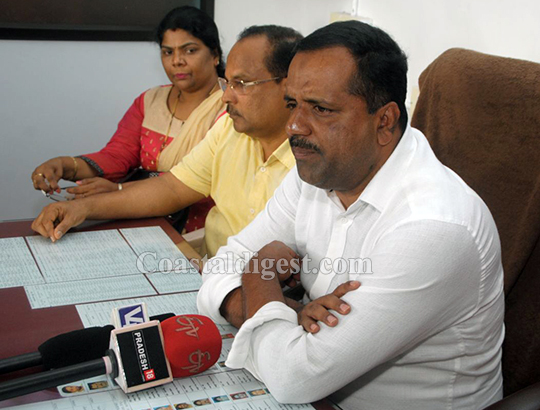Mangaluru, Oct 21: Expressing his strong opposition to the implementation of Uniform Civil Code against the will of crores of Muslims in India, Congress leader and minister for food, civil supplies and consumer affairs U T Khader has urged the union government to hold talks with Islamic scholars and experts of Shariah before taking any decision.

Speaking to media persons here, the minister said that the Constitution of India has granted Right to practice the Religion.
“Let those who discuss about triple talaq understand Shariat properly. Let the government discuss the issue with Ulema, scholars and other Islamic leaders before bringing laws against triple talaq,” he said adding that most of the people have misunderstood the concept of talaq in Islam.
There are several procedures under for talaq and three talaqs are not uttered at a stretch on a single day. Hence, let them discuss it properly before bringing law, Khader said.
Fake Aadhaar numbers
On the issue of seeding fake Aadhaar card numbers with ration cards, Mr. Khader said they have found as many as 1.6 lakh cards with fake Aadhaar numbers.
Following seeding of Aadhaar numbers, these card holders have obtained coupons for food grains at the ration shop. Mr. Khader said criminal cases will be filed against the accused, he said.
Subsidised kerosene for fishermen
Mr Khader said that an all-party delegation will be taken to the Union Petroleum Ministry demanding allocation of subsidised kerosene for fishermen using country boats.
He said that presently the State government had been giving fishermen a part of kerosene allocated by the Union government for distribution at the fair price shops in the State.
Each of the 915 registered country boat operators in Dakshina Kannada, Udupi and Uttara Kannada are getting 300 litres of kerosene at a subsidised rate per month.
“We have been doing it for many years. There have been instances when the supply from Centre got disrupted and thus causing problems for fishermen. Fishermen had difficulty in operating their boats for nearly a month and it was resolved on Wednesday,” he said.
Mr. Khader said that they planned to take an all-party delegation to Union Minister of State for Petroleum Dharmendra Pradhan and request a separate allocation of subsidised kerosene for fishermen in the three coastal districts.
Mr. Khader said they are waiting for the appointment of Mr. Pradhan.






Comments
Triple talaq in one go is the man made law. Which is not valid.
Quran says different. Read my last comment. Scroll down
@Venki
Rightly because of INDIAN govt law, many rapes, murders takes place, just apply sharia law and see the difference.
Even raj tackrey also agrees that sharia law should apply for rapists
Who is that ulema counci ....govt should go ahead ...if u have itching problem goto supreme court. .ucc is the need of the hour to bring down criminal activities and anti India works, sexual abuse on women .4th standard passed Ibrahim says ..to avoid women getting into prostitution ...polygamy is must ...hahaha ...what a immature statement and inno Muslim women porke togondu jihadi galige hoditha ilvalla Ade sojiga ...
According to islam.
Groom has to give dowry and not the bride. But in india it is opposite.
All groom sides are taking advantages.
Triple talaq in one go is not allowed in Islam...
Add new comment